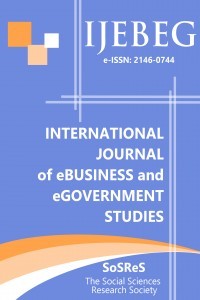E-GOVERNMENT IMPLEMENTATION IN ALBANIA, AS A TOOL TO INCREASE CITIZENS’PARTICIPATION AND BENEFITS
E-GOVERNMENT IMPLEMENTATION IN ALBANIA, AS A TOOL TO INCREASE CITIZENS’PARTICIPATION AND BENEFITS
Database processing in Albania and public use of information is at an early stage of development and is still considered as future potential expectation for a better governance. The implementation of e-government in terms of exchanging information among public servants, citizens, social and economic agents; Governance transparency in relation with the citizens and media; Decentralization and strengthening of the local autonomy; as well as participation of the citizens in local governance, today is a challenge to afford. Political programs of governments have not considered a priority the information management systems in Albania, especially in Public Administration, yet. Having secondary considerations, the information systems in local and central level are still not integrated and incomplete. This study examines issues caused by the missing of technology as a tool for a better governance and looks at some ways to turn into efficiency the information systems in Albania Along with the introduction of information technology and networking, a great need for training is identified in order for technology use to become a tool of improving governance and increase citizens’ participation in the decision - making process. Interesting implications are explored for policy makers and public authorities in order to maximize the public benefits from a good implementation of e-government in Albania.
Keywords:
e-government, e-services information technology,
___
- Albania, UN (2007), Millenium development goal, Albania, www.un.org.al/elib/php?elib,933, [Accessed 30.11.2008] http://
- Bavec, Cene, and Mirco Vintar, (2007), “What matters in the development of the e- government in the EU? Lecture Notes in Computer Science”, No. 4656, pp. 424-435.
- Bovaird, T. and E. Loffler (2003). Public management and governance. Routledge: NY.
- Council of ministers, Albania (2008), Weekly news bulletin, Vol.51.
- Grimsley, Michael and Anthony Meehan (2008), “Attaining Social Value from Electronic
- Government”, Electronic Journal of e-government, Volume 6, No.1, pp. 31-42. Kooiman, J. (2003). Governing as governance. Sage: London.
- Law, Edwin (2004), “Strategic implementation of e-government in OECD countries: major challenges”, 12th NISPAcee Annual Conference.
- Miller, JD , and R. Pardo (2000), Civic Scientific Literacy and Attitude to Science and Technology: A Comparative Analysis of the European Union.
- Minsikov Yuri (2003), “How ICTs can serve good governance, How good governance can serve E-government and How regional cooperation can serve information society”, LGI Journal, pp.2-10.
- Nyaboga, Andrew and Muroki F. Mwaura (2006), “E-government: The Implementation Of
- Effective Digital Technologies To Improve The Delivery Of Government Services To Their Consumers (Citizens)”, The Review of Business Information Systems, Vol.10(1). Prins, J.E.J. (2001). Designing E-government. On the Crossroads of Technological
- Innovation and Institutional Change. Kluwer Law International: Netherlands. Rabaiah, Abdelbaset, Eddy Vandijck and Farouk Musa (2006), “ Abstraction of e- government”, IADIS International Conference e-Commerce.
- Sejdini, Imelda (2008), “An Investigation on Information Management Issues in Albania;
- Efficiency and the Information Systems in Albanian Public Administration”, FEUT Conference proceedings book, Vol.4, pp.171-182. Tupper, Allan (2001), “The Contested Terrain of Canadian Public Administration in
- Canada’s Third Century”, Journal of Canadian Studies, Vol. 35(4). Turner, M.and D. Hulme (1997), Governance, administration & development, Macmillan Press, London, UK.
- UN, (2008), “ From E-government to connected Governance”, UN E-government survey.
- UNDP, Albania (2006), “Support to pilot E-government services for Government of
- Albania”, Final Report. Yigitcanlar, Tan (2003), “ Bridging the Gap between Citizens and Local Authorities via E- government”, University of Queensland,Brisbane, Australia.
- Başlangıç: 2009
- Yayıncı: Sosyal Bilimler Araştırmaları Derneği
Sayıdaki Diğer Makaleler
AN OVERVIEW OF THE E-GOVERNMENT INITIATIVES IN TURKEY IN RESPECT TO THE EU ACCESSION PROCESS
THE BROKERAGE ROLES IN THE ORGANIZATIONAL NETWORKS AND MANIPULATION OF INFORMATION FLOW
DEVELOPMENTS AND PROSPECTS IN e–GOVERNMENT IMPLEMENTATIONS IN TURKEY
E-GOVERNMENT IMPLEMENTATION IN ALBANIA, AS A TOOL TO INCREASE CITIZENS’PARTICIPATION AND BENEFITS
